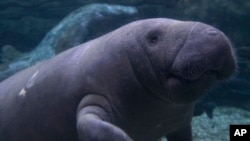The manatee, a species long considered at risk of extinction, has recovered in sufficient numbers to move from endangered to threatened status, U.S. wildlife officials said Thursday.
The U.S. Fish and Wildlife Service is proposing to reclassify the protection status of the West Indian manatee, including a Florida subspecies listed as endangered since 1967.
The decision, announced at the Miami Seaquarium, reflects a finding that about 6,300 manatees live off the Florida coast today, compared with roughly 1,200 counted when aerial surveys began in the early 1990s.
Federal and state officials described the likely reclassification as good news for the whiskered "sea cow" popular among Floridians.
"Based on the best available scientific information, we believe the manatee is no longer in danger of extinction," Michael Oetker, deputy regional director for the U.S. wildlife agency's southeast office, said at a news conference.
Federal regulators were petitioned to downgrade the status of the manatee by the Pacific Legal Foundation acting on behalf of Save Crystal River Inc., a nonprofit organization advocating for the rights of recreational water users in west-central Florida.
Motorboat propellers and speedboats are a leading cause of death and injury to Florida's manatees.
The West Indian manatee, related to the African and Amazon species and to the dugong of Australia, grows to 10 feet and more than 1,000 pounds (450 kg). It has no natural predators, but is vulnerable to prolonged exposure to water temperatures below 68 F (20 C) degrees.





